Financial Reporting: Analysis of M&S and Kitchen Financials
VerifiedAdded on 2020/07/23
|8
|1629
|49
Report
AI Summary
This report delves into the realm of financial reporting, examining its crucial role in conveying a company's financial performance and informing business decisions. It explores the significance of the integrated reporting framework, particularly concerning M&S, and the pivotal role stakeholders play in the decision-making process. Furthermore, the report provides a comparative analysis of principle-based and rule-based accounting standards, using Kitchen as a case study. It discusses the implications of moving from a rule-based to a principle-based system, including the importance of ethical considerations and the convergence of accounting principles. The analysis covers cash flow, predictive value, and the benefits of integrated reporting, offering critical evaluations of immaterial disclosures and the integrated reporting system itself. Decision-making tools for strategic planning, particularly in the context of purchasing a US company, are also introduced.
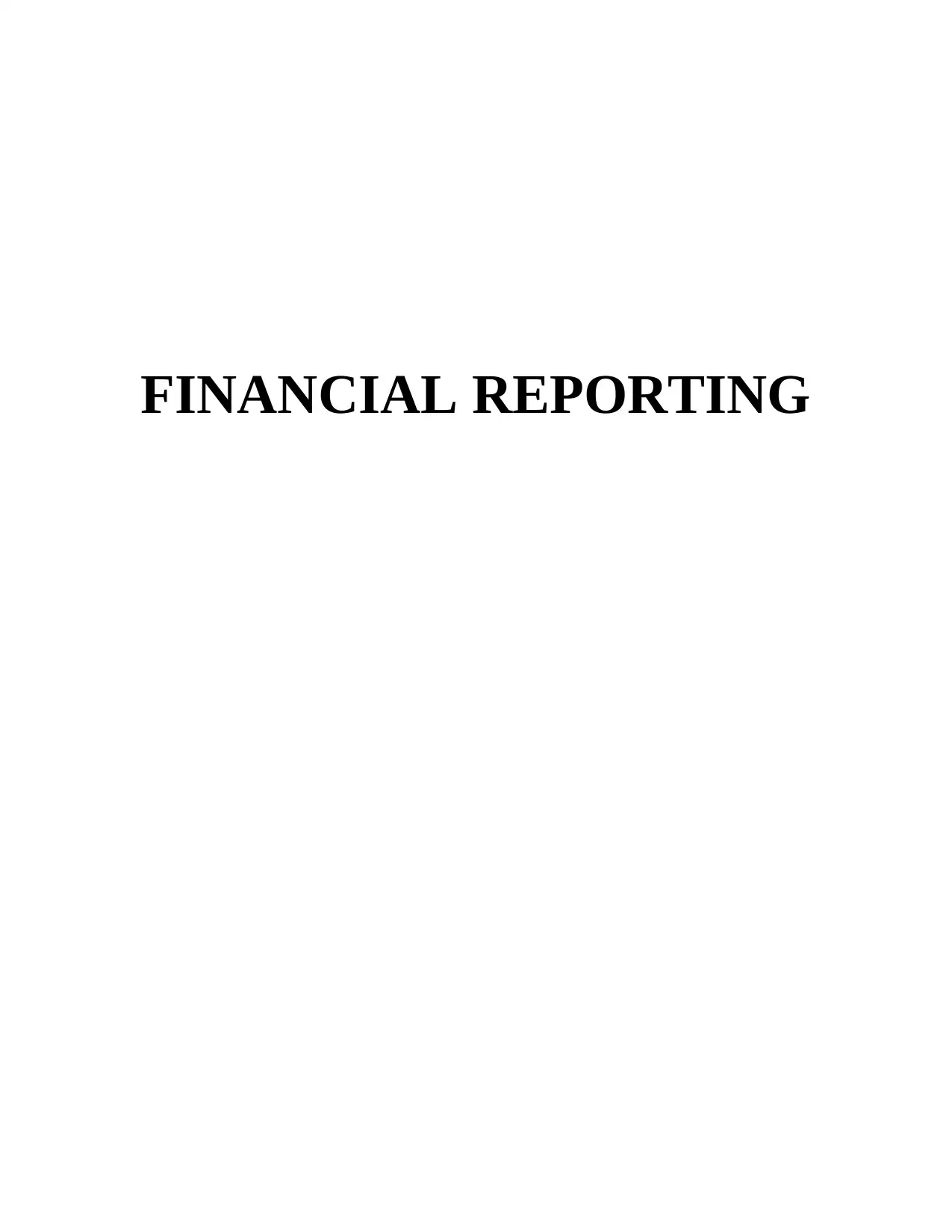
FINANCIAL REPORTING
Paraphrase This Document
Need a fresh take? Get an instant paraphrase of this document with our AI Paraphraser

TABLE OF CONTENTS
INTRODUCTION...........................................................................................................................1
PART 1............................................................................................................................................1
PART 2............................................................................................................................................3
CONCLUSION................................................................................................................................5
REFERENCES................................................................................................................................6
INTRODUCTION...........................................................................................................................1
PART 1............................................................................................................................................1
PART 2............................................................................................................................................3
CONCLUSION................................................................................................................................5
REFERENCES................................................................................................................................6
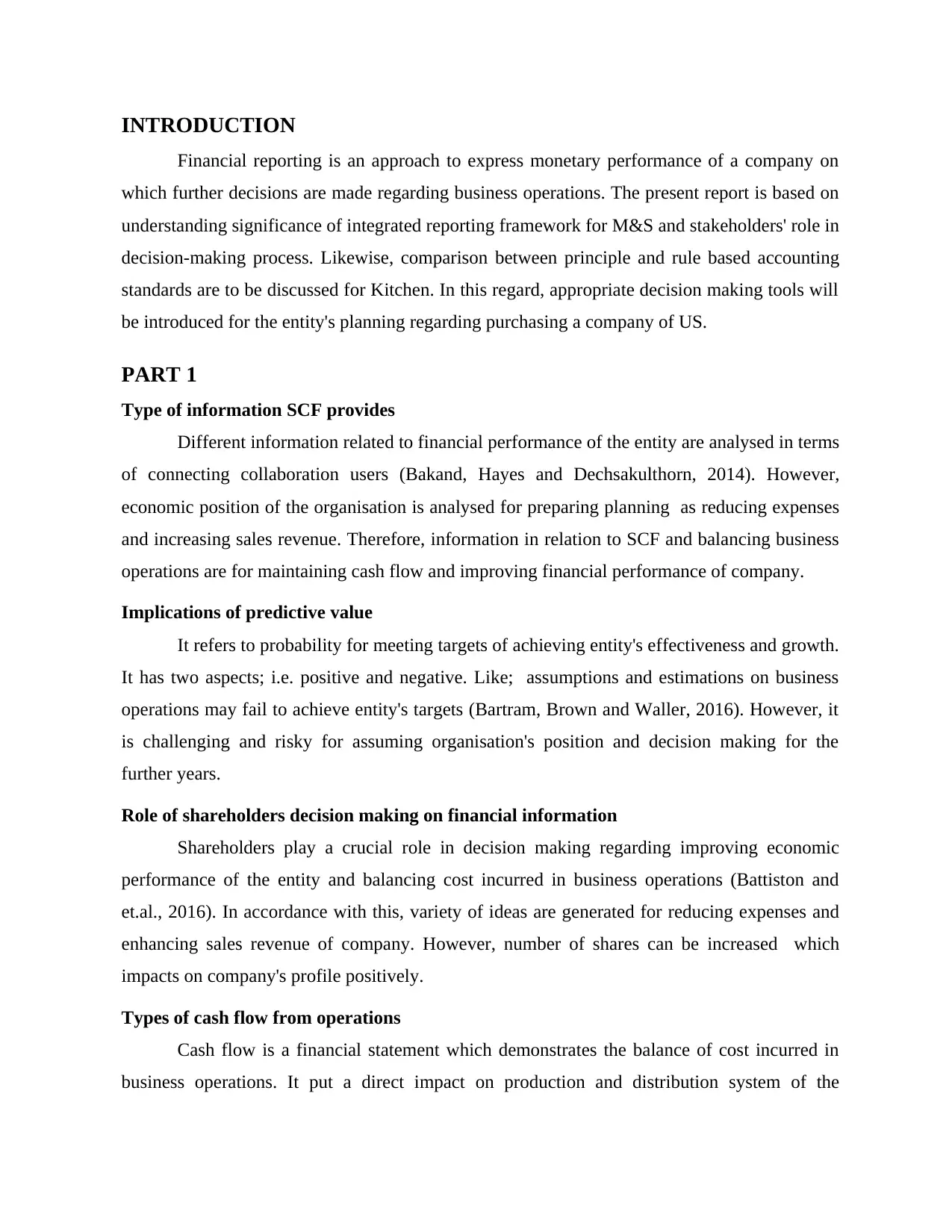
INTRODUCTION
Financial reporting is an approach to express monetary performance of a company on
which further decisions are made regarding business operations. The present report is based on
understanding significance of integrated reporting framework for M&S and stakeholders' role in
decision-making process. Likewise, comparison between principle and rule based accounting
standards are to be discussed for Kitchen. In this regard, appropriate decision making tools will
be introduced for the entity's planning regarding purchasing a company of US.
PART 1
Type of information SCF provides
Different information related to financial performance of the entity are analysed in terms
of connecting collaboration users (Bakand, Hayes and Dechsakulthorn, 2014). However,
economic position of the organisation is analysed for preparing planning as reducing expenses
and increasing sales revenue. Therefore, information in relation to SCF and balancing business
operations are for maintaining cash flow and improving financial performance of company.
Implications of predictive value
It refers to probability for meeting targets of achieving entity's effectiveness and growth.
It has two aspects; i.e. positive and negative. Like; assumptions and estimations on business
operations may fail to achieve entity's targets (Bartram, Brown and Waller, 2016). However, it
is challenging and risky for assuming organisation's position and decision making for the
further years.
Role of shareholders decision making on financial information
Shareholders play a crucial role in decision making regarding improving economic
performance of the entity and balancing cost incurred in business operations (Battiston and
et.al., 2016). In accordance with this, variety of ideas are generated for reducing expenses and
enhancing sales revenue of company. However, number of shares can be increased which
impacts on company's profile positively.
Types of cash flow from operations
Cash flow is a financial statement which demonstrates the balance of cost incurred in
business operations. It put a direct impact on production and distribution system of the
Financial reporting is an approach to express monetary performance of a company on
which further decisions are made regarding business operations. The present report is based on
understanding significance of integrated reporting framework for M&S and stakeholders' role in
decision-making process. Likewise, comparison between principle and rule based accounting
standards are to be discussed for Kitchen. In this regard, appropriate decision making tools will
be introduced for the entity's planning regarding purchasing a company of US.
PART 1
Type of information SCF provides
Different information related to financial performance of the entity are analysed in terms
of connecting collaboration users (Bakand, Hayes and Dechsakulthorn, 2014). However,
economic position of the organisation is analysed for preparing planning as reducing expenses
and increasing sales revenue. Therefore, information in relation to SCF and balancing business
operations are for maintaining cash flow and improving financial performance of company.
Implications of predictive value
It refers to probability for meeting targets of achieving entity's effectiveness and growth.
It has two aspects; i.e. positive and negative. Like; assumptions and estimations on business
operations may fail to achieve entity's targets (Bartram, Brown and Waller, 2016). However, it
is challenging and risky for assuming organisation's position and decision making for the
further years.
Role of shareholders decision making on financial information
Shareholders play a crucial role in decision making regarding improving economic
performance of the entity and balancing cost incurred in business operations (Battiston and
et.al., 2016). In accordance with this, variety of ideas are generated for reducing expenses and
enhancing sales revenue of company. However, number of shares can be increased which
impacts on company's profile positively.
Types of cash flow from operations
Cash flow is a financial statement which demonstrates the balance of cost incurred in
business operations. It put a direct impact on production and distribution system of the
⊘ This is a preview!⊘
Do you want full access?
Subscribe today to unlock all pages.

Trusted by 1+ million students worldwide
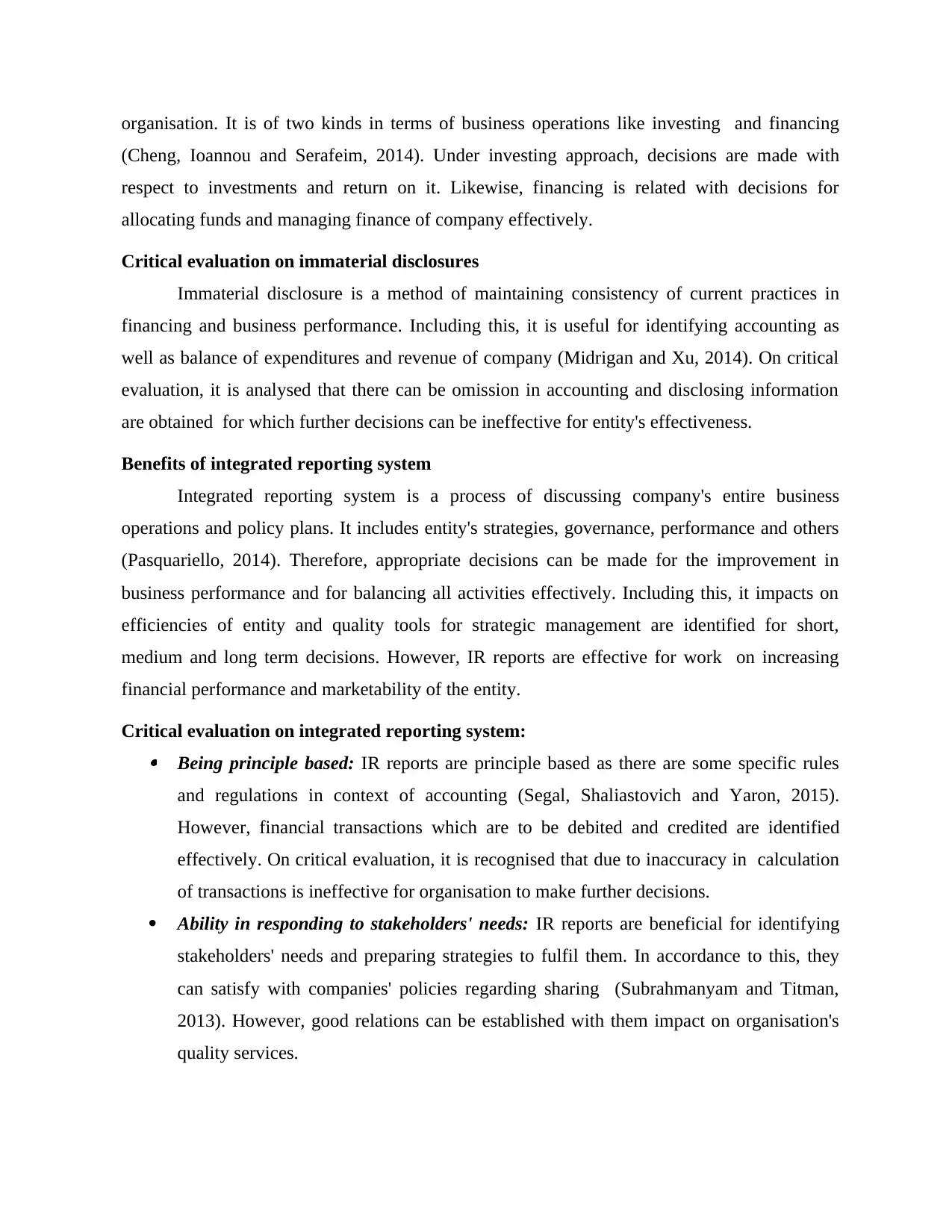
organisation. It is of two kinds in terms of business operations like investing and financing
(Cheng, Ioannou and Serafeim, 2014). Under investing approach, decisions are made with
respect to investments and return on it. Likewise, financing is related with decisions for
allocating funds and managing finance of company effectively.
Critical evaluation on immaterial disclosures
Immaterial disclosure is a method of maintaining consistency of current practices in
financing and business performance. Including this, it is useful for identifying accounting as
well as balance of expenditures and revenue of company (Midrigan and Xu, 2014). On critical
evaluation, it is analysed that there can be omission in accounting and disclosing information
are obtained for which further decisions can be ineffective for entity's effectiveness.
Benefits of integrated reporting system
Integrated reporting system is a process of discussing company's entire business
operations and policy plans. It includes entity's strategies, governance, performance and others
(Pasquariello, 2014). Therefore, appropriate decisions can be made for the improvement in
business performance and for balancing all activities effectively. Including this, it impacts on
efficiencies of entity and quality tools for strategic management are identified for short,
medium and long term decisions. However, IR reports are effective for work on increasing
financial performance and marketability of the entity.
Critical evaluation on integrated reporting system: Being principle based: IR reports are principle based as there are some specific rules
and regulations in context of accounting (Segal, Shaliastovich and Yaron, 2015).
However, financial transactions which are to be debited and credited are identified
effectively. On critical evaluation, it is recognised that due to inaccuracy in calculation
of transactions is ineffective for organisation to make further decisions.
Ability in responding to stakeholders' needs: IR reports are beneficial for identifying
stakeholders' needs and preparing strategies to fulfil them. In accordance to this, they
can satisfy with companies' policies regarding sharing (Subrahmanyam and Titman,
2013). However, good relations can be established with them impact on organisation's
quality services.
(Cheng, Ioannou and Serafeim, 2014). Under investing approach, decisions are made with
respect to investments and return on it. Likewise, financing is related with decisions for
allocating funds and managing finance of company effectively.
Critical evaluation on immaterial disclosures
Immaterial disclosure is a method of maintaining consistency of current practices in
financing and business performance. Including this, it is useful for identifying accounting as
well as balance of expenditures and revenue of company (Midrigan and Xu, 2014). On critical
evaluation, it is analysed that there can be omission in accounting and disclosing information
are obtained for which further decisions can be ineffective for entity's effectiveness.
Benefits of integrated reporting system
Integrated reporting system is a process of discussing company's entire business
operations and policy plans. It includes entity's strategies, governance, performance and others
(Pasquariello, 2014). Therefore, appropriate decisions can be made for the improvement in
business performance and for balancing all activities effectively. Including this, it impacts on
efficiencies of entity and quality tools for strategic management are identified for short,
medium and long term decisions. However, IR reports are effective for work on increasing
financial performance and marketability of the entity.
Critical evaluation on integrated reporting system: Being principle based: IR reports are principle based as there are some specific rules
and regulations in context of accounting (Segal, Shaliastovich and Yaron, 2015).
However, financial transactions which are to be debited and credited are identified
effectively. On critical evaluation, it is recognised that due to inaccuracy in calculation
of transactions is ineffective for organisation to make further decisions.
Ability in responding to stakeholders' needs: IR reports are beneficial for identifying
stakeholders' needs and preparing strategies to fulfil them. In accordance to this, they
can satisfy with companies' policies regarding sharing (Subrahmanyam and Titman,
2013). However, good relations can be established with them impact on organisation's
quality services.
Paraphrase This Document
Need a fresh take? Get an instant paraphrase of this document with our AI Paraphraser
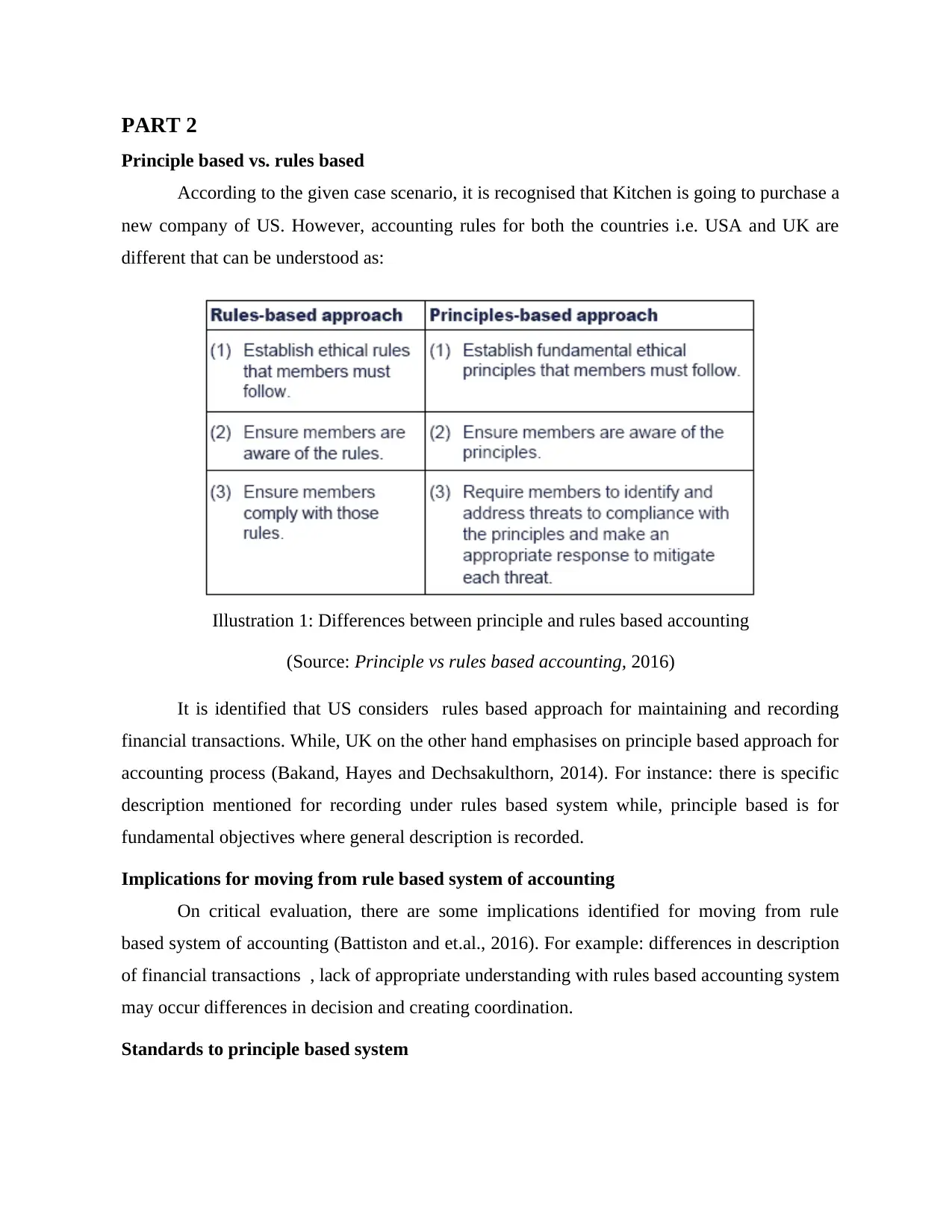
PART 2
Principle based vs. rules based
According to the given case scenario, it is recognised that Kitchen is going to purchase a
new company of US. However, accounting rules for both the countries i.e. USA and UK are
different that can be understood as:
It is identified that US considers rules based approach for maintaining and recording
financial transactions. While, UK on the other hand emphasises on principle based approach for
accounting process (Bakand, Hayes and Dechsakulthorn, 2014). For instance: there is specific
description mentioned for recording under rules based system while, principle based is for
fundamental objectives where general description is recorded.
Implications for moving from rule based system of accounting
On critical evaluation, there are some implications identified for moving from rule
based system of accounting (Battiston and et.al., 2016). For example: differences in description
of financial transactions , lack of appropriate understanding with rules based accounting system
may occur differences in decision and creating coordination.
Standards to principle based system
Illustration 1: Differences between principle and rules based accounting
(Source: Principle vs rules based accounting, 2016)
Principle based vs. rules based
According to the given case scenario, it is recognised that Kitchen is going to purchase a
new company of US. However, accounting rules for both the countries i.e. USA and UK are
different that can be understood as:
It is identified that US considers rules based approach for maintaining and recording
financial transactions. While, UK on the other hand emphasises on principle based approach for
accounting process (Bakand, Hayes and Dechsakulthorn, 2014). For instance: there is specific
description mentioned for recording under rules based system while, principle based is for
fundamental objectives where general description is recorded.
Implications for moving from rule based system of accounting
On critical evaluation, there are some implications identified for moving from rule
based system of accounting (Battiston and et.al., 2016). For example: differences in description
of financial transactions , lack of appropriate understanding with rules based accounting system
may occur differences in decision and creating coordination.
Standards to principle based system
Illustration 1: Differences between principle and rules based accounting
(Source: Principle vs rules based accounting, 2016)
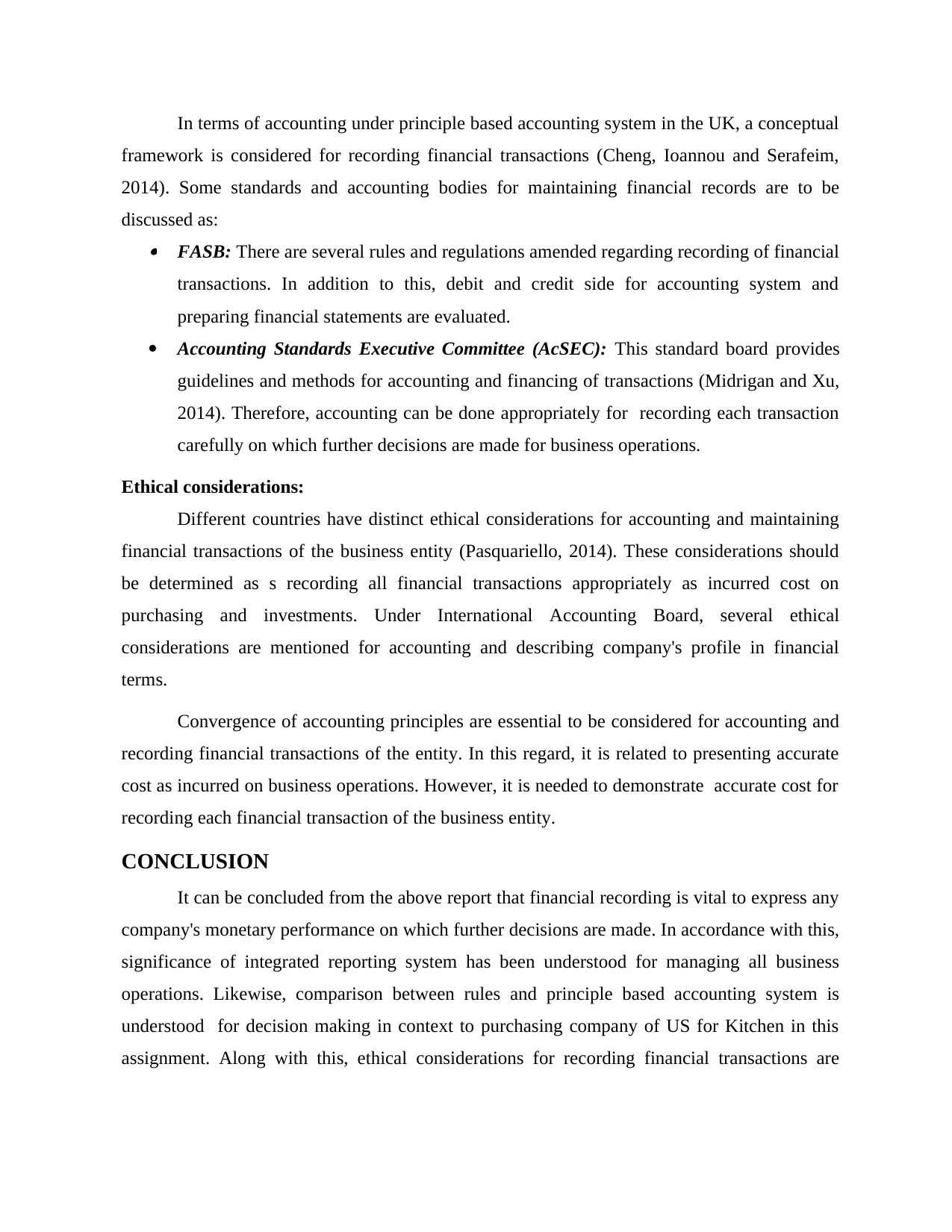
In terms of accounting under principle based accounting system in the UK, a conceptual
framework is considered for recording financial transactions (Cheng, Ioannou and Serafeim,
2014). Some standards and accounting bodies for maintaining financial records are to be
discussed as: FASB: There are several rules and regulations amended regarding recording of financial
transactions. In addition to this, debit and credit side for accounting system and
preparing financial statements are evaluated.
Accounting Standards Executive Committee (AcSEC): This standard board provides
guidelines and methods for accounting and financing of transactions (Midrigan and Xu,
2014). Therefore, accounting can be done appropriately for recording each transaction
carefully on which further decisions are made for business operations.
Ethical considerations:
Different countries have distinct ethical considerations for accounting and maintaining
financial transactions of the business entity (Pasquariello, 2014). These considerations should
be determined as s recording all financial transactions appropriately as incurred cost on
purchasing and investments. Under International Accounting Board, several ethical
considerations are mentioned for accounting and describing company's profile in financial
terms.
Convergence of accounting principles are essential to be considered for accounting and
recording financial transactions of the entity. In this regard, it is related to presenting accurate
cost as incurred on business operations. However, it is needed to demonstrate accurate cost for
recording each financial transaction of the business entity.
CONCLUSION
It can be concluded from the above report that financial recording is vital to express any
company's monetary performance on which further decisions are made. In accordance with this,
significance of integrated reporting system has been understood for managing all business
operations. Likewise, comparison between rules and principle based accounting system is
understood for decision making in context to purchasing company of US for Kitchen in this
assignment. Along with this, ethical considerations for recording financial transactions are
framework is considered for recording financial transactions (Cheng, Ioannou and Serafeim,
2014). Some standards and accounting bodies for maintaining financial records are to be
discussed as: FASB: There are several rules and regulations amended regarding recording of financial
transactions. In addition to this, debit and credit side for accounting system and
preparing financial statements are evaluated.
Accounting Standards Executive Committee (AcSEC): This standard board provides
guidelines and methods for accounting and financing of transactions (Midrigan and Xu,
2014). Therefore, accounting can be done appropriately for recording each transaction
carefully on which further decisions are made for business operations.
Ethical considerations:
Different countries have distinct ethical considerations for accounting and maintaining
financial transactions of the business entity (Pasquariello, 2014). These considerations should
be determined as s recording all financial transactions appropriately as incurred cost on
purchasing and investments. Under International Accounting Board, several ethical
considerations are mentioned for accounting and describing company's profile in financial
terms.
Convergence of accounting principles are essential to be considered for accounting and
recording financial transactions of the entity. In this regard, it is related to presenting accurate
cost as incurred on business operations. However, it is needed to demonstrate accurate cost for
recording each financial transaction of the business entity.
CONCLUSION
It can be concluded from the above report that financial recording is vital to express any
company's monetary performance on which further decisions are made. In accordance with this,
significance of integrated reporting system has been understood for managing all business
operations. Likewise, comparison between rules and principle based accounting system is
understood for decision making in context to purchasing company of US for Kitchen in this
assignment. Along with this, ethical considerations for recording financial transactions are
⊘ This is a preview!⊘
Do you want full access?
Subscribe today to unlock all pages.

Trusted by 1+ million students worldwide

recognised. However, importance of maintaining and recording financial transactions of a
company has been understood.
company has been understood.
Paraphrase This Document
Need a fresh take? Get an instant paraphrase of this document with our AI Paraphraser
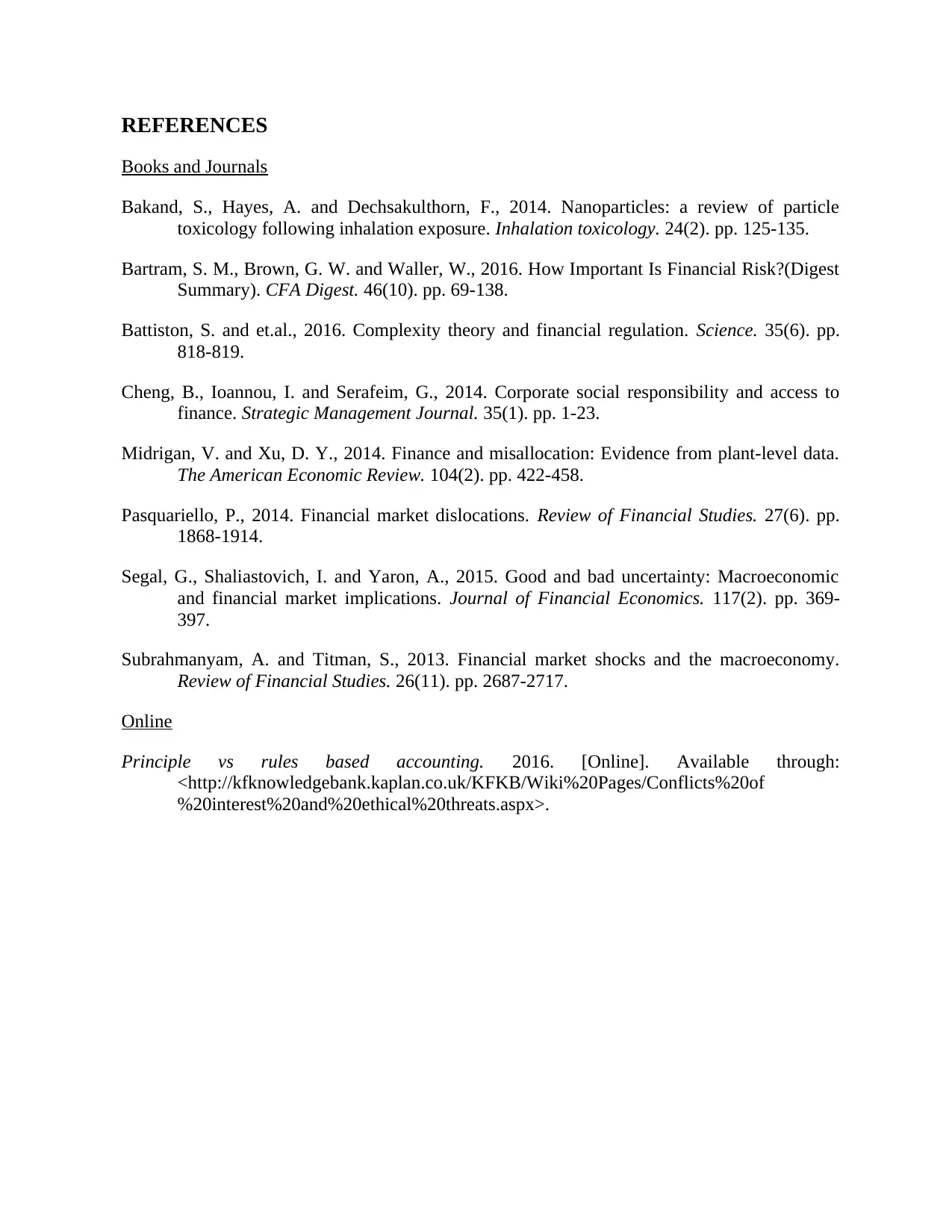
REFERENCES
Books and Journals
Bakand, S., Hayes, A. and Dechsakulthorn, F., 2014. Nanoparticles: a review of particle
toxicology following inhalation exposure. Inhalation toxicology. 24(2). pp. 125-135.
Bartram, S. M., Brown, G. W. and Waller, W., 2016. How Important Is Financial Risk?(Digest
Summary). CFA Digest. 46(10). pp. 69-138.
Battiston, S. and et.al., 2016. Complexity theory and financial regulation. Science. 35(6). pp.
818-819.
Cheng, B., Ioannou, I. and Serafeim, G., 2014. Corporate social responsibility and access to
finance. Strategic Management Journal. 35(1). pp. 1-23.
Midrigan, V. and Xu, D. Y., 2014. Finance and misallocation: Evidence from plant-level data.
The American Economic Review. 104(2). pp. 422-458.
Pasquariello, P., 2014. Financial market dislocations. Review of Financial Studies. 27(6). pp.
1868-1914.
Segal, G., Shaliastovich, I. and Yaron, A., 2015. Good and bad uncertainty: Macroeconomic
and financial market implications. Journal of Financial Economics. 117(2). pp. 369-
397.
Subrahmanyam, A. and Titman, S., 2013. Financial market shocks and the macroeconomy.
Review of Financial Studies. 26(11). pp. 2687-2717.
Online
Principle vs rules based accounting. 2016. [Online]. Available through:
<http://kfknowledgebank.kaplan.co.uk/KFKB/Wiki%20Pages/Conflicts%20of
%20interest%20and%20ethical%20threats.aspx>.
Books and Journals
Bakand, S., Hayes, A. and Dechsakulthorn, F., 2014. Nanoparticles: a review of particle
toxicology following inhalation exposure. Inhalation toxicology. 24(2). pp. 125-135.
Bartram, S. M., Brown, G. W. and Waller, W., 2016. How Important Is Financial Risk?(Digest
Summary). CFA Digest. 46(10). pp. 69-138.
Battiston, S. and et.al., 2016. Complexity theory and financial regulation. Science. 35(6). pp.
818-819.
Cheng, B., Ioannou, I. and Serafeim, G., 2014. Corporate social responsibility and access to
finance. Strategic Management Journal. 35(1). pp. 1-23.
Midrigan, V. and Xu, D. Y., 2014. Finance and misallocation: Evidence from plant-level data.
The American Economic Review. 104(2). pp. 422-458.
Pasquariello, P., 2014. Financial market dislocations. Review of Financial Studies. 27(6). pp.
1868-1914.
Segal, G., Shaliastovich, I. and Yaron, A., 2015. Good and bad uncertainty: Macroeconomic
and financial market implications. Journal of Financial Economics. 117(2). pp. 369-
397.
Subrahmanyam, A. and Titman, S., 2013. Financial market shocks and the macroeconomy.
Review of Financial Studies. 26(11). pp. 2687-2717.
Online
Principle vs rules based accounting. 2016. [Online]. Available through:
<http://kfknowledgebank.kaplan.co.uk/KFKB/Wiki%20Pages/Conflicts%20of
%20interest%20and%20ethical%20threats.aspx>.
1 out of 8
Related Documents
Your All-in-One AI-Powered Toolkit for Academic Success.
+13062052269
info@desklib.com
Available 24*7 on WhatsApp / Email
![[object Object]](/_next/static/media/star-bottom.7253800d.svg)
Unlock your academic potential
Copyright © 2020–2026 A2Z Services. All Rights Reserved. Developed and managed by ZUCOL.





